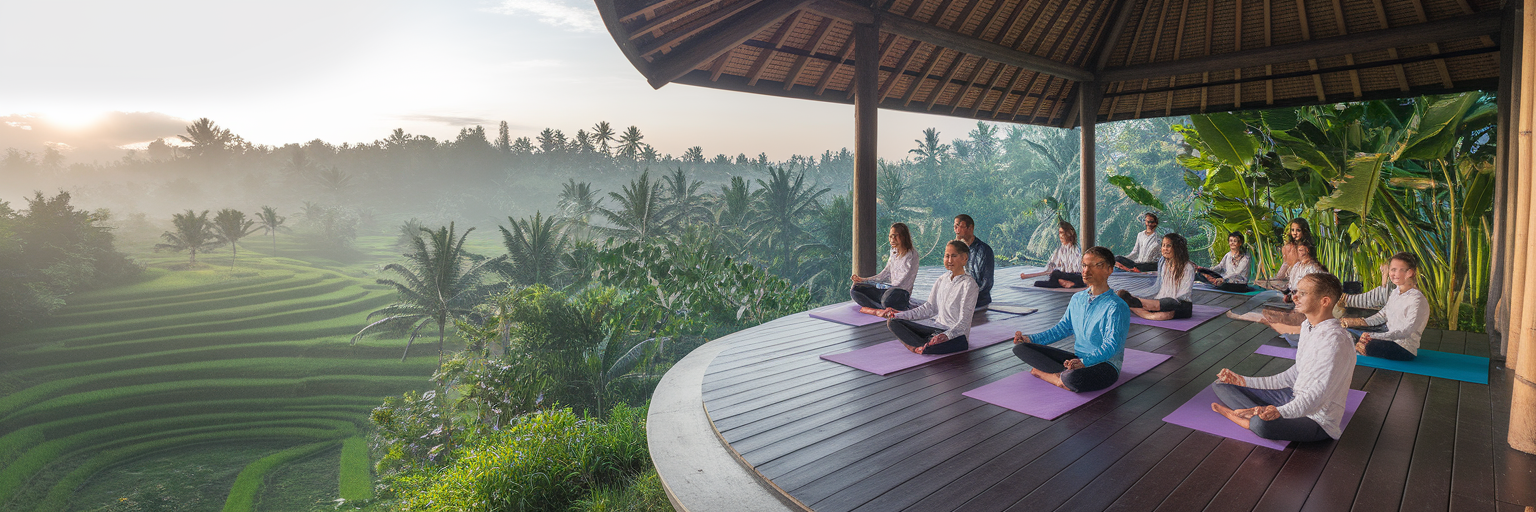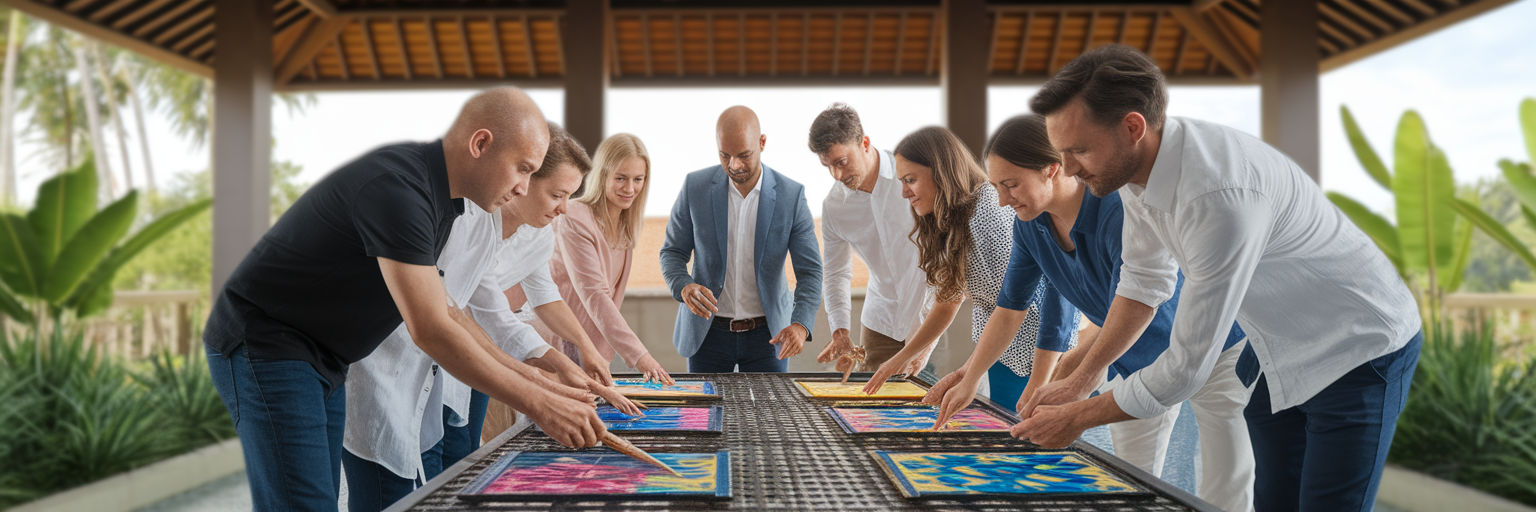Meaningful Bali Incentive Trips for Lasting Team Impact
Learn how to design corporate incentive trips in Bali that reward your team while contributing positively to local communities and the environment.

Learn how to design corporate incentive trips in Bali that reward your team while contributing positively to local communities and the environment.

The conversation around corporate rewards has shifted. Top talent today is motivated less by fleeting perks and more by experiences that offer genuine purpose and connection. This is where purpose-driven incentive programs move from a line item to a strategic investment in company culture. While many destinations offer beautiful scenery, Bali provides something more: a reliable and mature framework for creating trips with real substance.
The island’s unique combination of profound cultural heritage and a well-developed eco-tourism infrastructure makes it a leader in this space. This isn't just about good intentions. It's supported by tangible government action, such as the island-wide ban on single-use plastics and a commitment to integrating renewable energy into its tourism sector. This foundation gives companies confidence that their sustainable event plans are built on solid ground, not just marketing claims.
Choosing Bali for corporate social responsibility travel is a deliberate statement. It signals a commitment to values that resonate deeply with modern employees and customers. A trip here is not an expense but an investment in team morale, loyalty, and brand reputation. It’s an opportunity to create experiences that are not only memorable but meaningful. For more on our approach to crafting these journeys, you can learn about us and our philosophy.

With Bali’s supportive ecosystem in place, a truly purposeful trip moves teams from being passive observers to active participants. The most profound connections are not made from the window of a tour bus but through shared, hands-on activities. These experiences create far more memorable bonds and a stronger sense of collective achievement than conventional leisure tours, making them a superior tool for corporate team building in Bali.
Instead of simply seeing the culture, your team can become part of it. These are just a few examples of the bespoke event services we craft to align with a brand's unique values:
These active, participatory moments are what transform a corporate trip into a shared story of impact and connection.
The choice of where your team stays is one of the most visible statements your company can make. For eco-friendly corporate retreats, selecting the right accommodation is a critical decision that goes far beyond logistics. It’s a core part of the trip's narrative, and due diligence is essential to avoid the pitfalls of greenwashing.
Truly sustainable properties demonstrate their commitment through infrastructure, not just marketing slogans. Look for verifiable features that show a deep-seated ethos of environmental stewardship. This includes things like on-site solar farms that power the property, closed-loop water recycling systems that minimize waste, and architecture that utilizes locally sourced bamboo or reclaimed wood. These are not just amenities; they are proof of a genuine commitment.
How can you be sure? Third-party eco-certifications like Green Globe or EarthCheck provide a transparent way for planners to verify a property's claims. These certifications require rigorous audits and continuous improvement, offering a reliable benchmark for accountability. The right accommodation reinforces the purpose of the trip at every turn, ensuring the team is immersed in a truly sustainable environment.
| Sustainability Feature | What to Look For | Potential Red Flags (Greenwashing) |
|---|---|---|
| Energy Management | On-site renewable energy (solar), energy-efficient lighting (LED), key-card activated power | Vague claims like 'green energy' without specifics; no data on energy reduction |
| Water Conservation | Rainwater harvesting systems, greywater recycling for irrigation, low-flow fixtures | Simply asking guests to reuse towels without mentioning any infrastructure investment |
| Waste Reduction | No single-use plastics, on-site composting programs, partnerships to donate surplus food | A recycling bin in the lobby with no comprehensive waste management policy |
| Community Support | Sourcing food from local farms, employing a high percentage of local staff, offering fair wages | Selling local crafts in the gift shop with no information on sourcing or artist benefit |

Food is a powerful connector to place and culture. On a purposeful incentive trip, meals are transformed from simple sustenance into memorable, shared lessons. Sustainable gastronomy is an approach that connects your team directly to Bali’s environment and community, creating an experience that is as delicious as it is impactful.
Imagine dining at a farm-to-table venue where the ingredients are sourced from an on-site organic garden or from neighboring small-scale farms. This model drastically reduces food miles, ensures freshness, and provides direct economic support to the local agricultural community. It’s a tangible way to taste the island’s commitment to sustainability.
Another powerful team-building activity is a hands-on Balinese cooking class. Led by a local chef, participants learn about the island’s unique spices and traditional culinary techniques. It’s a collaborative and sensory experience that fosters communication and creates a shared sense of accomplishment. Leading venues also close the loop on waste, implementing composting programs or partnering with organizations to donate surplus food. This mindful approach to dining ensures that every meal reinforces the trip’s core values of respect for culture and environment.
An authentically low-impact program requires meticulous planning behind the scenes. Transport is often a major contributor to a trip’s carbon footprint, but with deliberate choices, its impact can be significantly minimized. This focus on smart logistics is non-negotiable for delivering responsible sustainable incentive travel Bali.
Thoughtful logistical planning demonstrates a commitment that goes beyond surface-level gestures, proving that every detail of the trip has been considered with care.
For corporate decision-makers, the question of return on investment is always present. We believe in measuring success through a lens of "Return on Impact," which captures a more holistic and meaningful picture of a program's value. This approach aligns with a broader trend where the goal is to offer teams a cohesive experience while creating a positive and lasting impact on local communities and ecosystems, as noted by Trusted DMC.
Tracking the outcomes of Bali community impact travel involves both quantitative and qualitative metrics. This could include the total funds directed to local artisans, the number of mangroves planted during a conservation activity, or the square meters of coral reef restored. Equally important is the qualitative data from post-trip surveys measuring shifts in employee morale, engagement, and sense of purpose.
Sharing a transparent impact report with stakeholders is essential for building credibility and demonstrating a genuine commitment. These sustainable frameworks are not limited to one location; they can be applied to other leading MICE destinations, including our work in Bangkok. The true value of such a program lies in its lasting positive effect on your team, the host community, and your company’s culture. If you're ready to design an incentive program with lasting impact, we invite you to work with us.